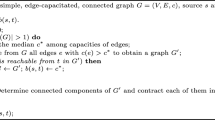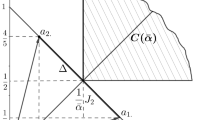Abstract
We consider a model of game-theoretic network design initially studied by Anshelevich et al. (Proceedings of the 45th Annual Symposium on Foundations of Computer Science (FOCS), pp. 295–304, 2004), where selfish players select paths in a network to minimize their cost, which is prescribed by Shapley cost shares. If all players are identical, the cost share incurred by a player for an edge in its path is the fixed cost of the edge divided by the number of players using it. In this special case, Anshelevich et al. (Proceedings of the 45th Annual Symposium on Foundations of Computer Science (FOCS), pp. 295–304, 2004) proved that pure-strategy Nash equilibria always exist and that the price of stability—the ratio between the cost of the best Nash equilibrium and that of an optimal solution—is Θ(log k), where k is the number of players. Little was known about the existence of equilibria or the price of stability in the general weighted version of the game. Here, each player i has a weight w i ≥1, and its cost share of an edge in its path equals w i times the edge cost, divided by the total weight of the players using the edge.
This paper presents the first general results on weighted Shapley network design games. First, we give a simple example with no pure-strategy Nash equilibrium. This motivates considering the price of stability with respect to α-approximate Nash equilibria—outcomes from which no player can decrease its cost by more than an α multiplicative factor. Our first positive result is that O(log w max )-approximate Nash equilibria exist in all weighted Shapley network design games, where w max is the maximum player weight. More generally, we establish the following trade-off between the two objectives of good stability and low cost: for every α=Ω(log w max ), the price of stability with respect to O(α)-approximate Nash equilibria is O((log W)/α), where W is the sum of the players’ weights. In particular, there is always an O(log W)-approximate Nash equilibrium with cost within a constant factor of optimal.
Finally, we show that this trade-off curve is nearly optimal: we construct a family of networks without o(log w max / log log w max )-approximate Nash equilibria, and show that for all α=Ω(log w max /log log w max ), achieving a price of stability of O(log W/α) requires relaxing equilibrium constraints by an Ω(α) factor.
Similar content being viewed by others
References
Albers, S., Eilts, S., Even-Dar, E., Mansour, Y., Roditty, L.: On Nash equilibria for a network creation game. In: Proceedings of the 17th Annual ACM-SIAM Symposium on Discrete Algorithms (SODA), pp. 89–98 (2006)
Anshelevich, E., Dasgupta, A., Tardos, É., Wexler, T.: Near-optimal network design with selfish agents. In: Proceedings of the 35th Annual ACM Symposium on Theory of Computing (STOC), pp. 511–520 (2003)
Anshelevich, E., Dasgupta, A., Kleinberg, J., Tardos, É., Wexler, T., Roughgarden, T.: The price of stability for network design with fair cost allocation. In: Proceedings of the 45th Annual Symposium on Foundations of Computer Science (FOCS), pp. 295–304 (2004)
Aumann, R.J.: Subjectivity and correlation in randomized strategies. J. Math. Econ. 1(1), 67–96 (1974)
Awerbuch, B., Azar, Y., Epstein, L.: The price of routing unsplittable flow. In: Proceedings of the 37th Annual ACM Symposium on Theory of Computing (STOC), pp. 57–66 (2005)
Bala, V., Goyal, S.: A non-cooperative model of network formation. Econometrica 68(5), 1181–1229 (2000)
Beckmann, M.J., McGuire, C.B., Winsten, C.B.: Studies in the Economics of Transportation. Yale University Press, New Haven (1956)
Christodoulou, G., Koutsoupias, E.: On the price of anarchy and stability of correlated equilibria of linear congestion games. In: Proceedings of the 13th Annual Eurpoean Symposium on Algorithms (ESA), pp. 59–70 (2005)
Christodoulou, G., Koutsoupias, E.: The price of anarchy of finite congestion games. In: Proceedings of the 37th Annual ACM Symposium on Theory of Computing (STOC), pp. 67–73 (2005)
Corbo, J., Parkes, D.C.: The price of selfish behavior in bilateral network formation games. In: Proceedings of the 24th ACM Symposium on Principles of Distributed Computing (PODC), pp. 99–107 (2005)
Dubey, P.: Inefficiency of Nash equilibria. Math. Oper. Res. 11(1), 1–8 (1986)
Fabrikant, A., Luthra, A., Maneva, E., Papadimitriou, C.H., Shenker, S.J.: On a network creation game. In: Proceedings of the 22nd ACM Symposium on Principles of Distributed Computing (PODC), pp. 347–351 (2003)
Goemans, M.X., Mirrokni, V., Vetta, A.: Sink equilibria and convergence. In: Proceedings of the 46th Annual Symposium on Foundations of Computer Science (FOCS), pp. 142–151 (2005)
Jackson, M.O.: A survey of models of network formation: Stability and efficiency. In: Demange, G., Wooders, M. (eds.) Group Formation in Economics; Networks, Clubs, and Coalitions, Chap. 1. Cambridge University Press, Cambridge (2005)
Jain, K., Vazirani, V.V.: Applications of approximation algorithms to cooperative games. In: Proceedings of the 33rd Annual ACM Symposium on Theory of Computing (STOC), pp. 364–372 (2001)
Koutsoupias, E., Papadimitriou, C.H.: Worst-case equilibria. In: Proceedings of the 16th Annual Symposium on Theoretical Aspects of Computer Science (STACS). Lecture Notes in Computer Science, vol. 1563, pp. 404–413. Springer, Berlin (1999)
Monderer, D., Shapley, L.S.: Potential games. Games Econ. Behav. 14(1), 124–143 (1996)
Moscibroda, T., Schmid, S., Wattenhofer, R.: On the topologies formed by selfish peers. In: Proceedings of the 25th ACM Symposium on Principles of Distributed Computing (PODC), pp. 133–142 (2006)
Moulin, H., Shenker, S.: Strategyproof sharing of submodular costs: Budget balance versus efficiency. Econ. Theory 18(3), 511–533 (2001)
Nash, J.F.: Equilibrium points in N-person games. Proc. Nat. Acad. Sci. 36(1), 48–49 (1950)
Papadimitriou, C.H.: Algorithms, games, and the Internet. In: Proceedings of the 33rd Annual ACM Symposium on Theory of Computing (STOC), pp. 749–753 (2001)
Rosenthal, R.W.: A class of games possessing pure-strategy Nash equilibria. Int. J. Game Theory 2(1), 65–67 (1973)
Rosenthal, R.W.: The network equilibrium problem in integers. Networks 3(1), 53–59 (1973)
Roughgarden, T.: Potential functions and the inefficiency of equilibria. In: Proceedings of the International Congress of Mathematicians (ICM), vol. III, pp. 1071–1094 (2006)
Schulz, A.S., Stier Moses, N.: On the performance of user equilibria in traffic networks. In: Proceedings of the 14th Annual ACM-SIAM Symposium on Discrete Algorithms (SODA), pp. 86–87 (2003)
Author information
Authors and Affiliations
Corresponding author
Additional information
Research of H.-L. Chen supported in part by NSF Award 0323766.
Research of T. Roughgarden supported in part by ONR grant N00014-04-1-0725, DARPA grant W911NF-04-9-0001, and an NSF CAREER Award.
Rights and permissions
About this article
Cite this article
Chen, HL., Roughgarden, T. Network Design with Weighted Players. Theory Comput Syst 45, 302–324 (2009). https://doi.org/10.1007/s00224-008-9128-8
Received:
Accepted:
Published:
Issue Date:
DOI: https://doi.org/10.1007/s00224-008-9128-8




